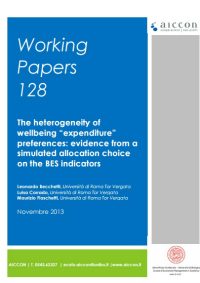128 – The heterogeneity of wellbeing “expenditure” preferences
Abstract
With an online survey on major Italian newspapers we ask respondents to simulate the typical policymaker decision, that is, the dilemma of allocating scarce financial resources among alternative competing goals using the domains of the newly defined Italian BES (sustainable and equitable wellbeing) indicators.
We find that two major factors explaining heterogeneity in preferences on expenditure in major wellbeing domains are left/right wing political orientation and low/high education.
With regard to political orientation we identify “large coalition” items where left/right positions are similar and domains where opinion are more polarized. Overall, our findings document that left wing respondents would spend relatively more on environment, research and innovation, culture and education and relatively less on safety and measures directly aimed at improving economic wellbeing.
We conclude that these findings make themselves significantly more oriented toward environmental sustainability in a hypothetical trade?off between economic growth and the latter.
Keywords: wellbeing indicators, political preferences, wellbeing preferences.
JEL numbers: I0 (health education and welfare); H0 (public economics).

